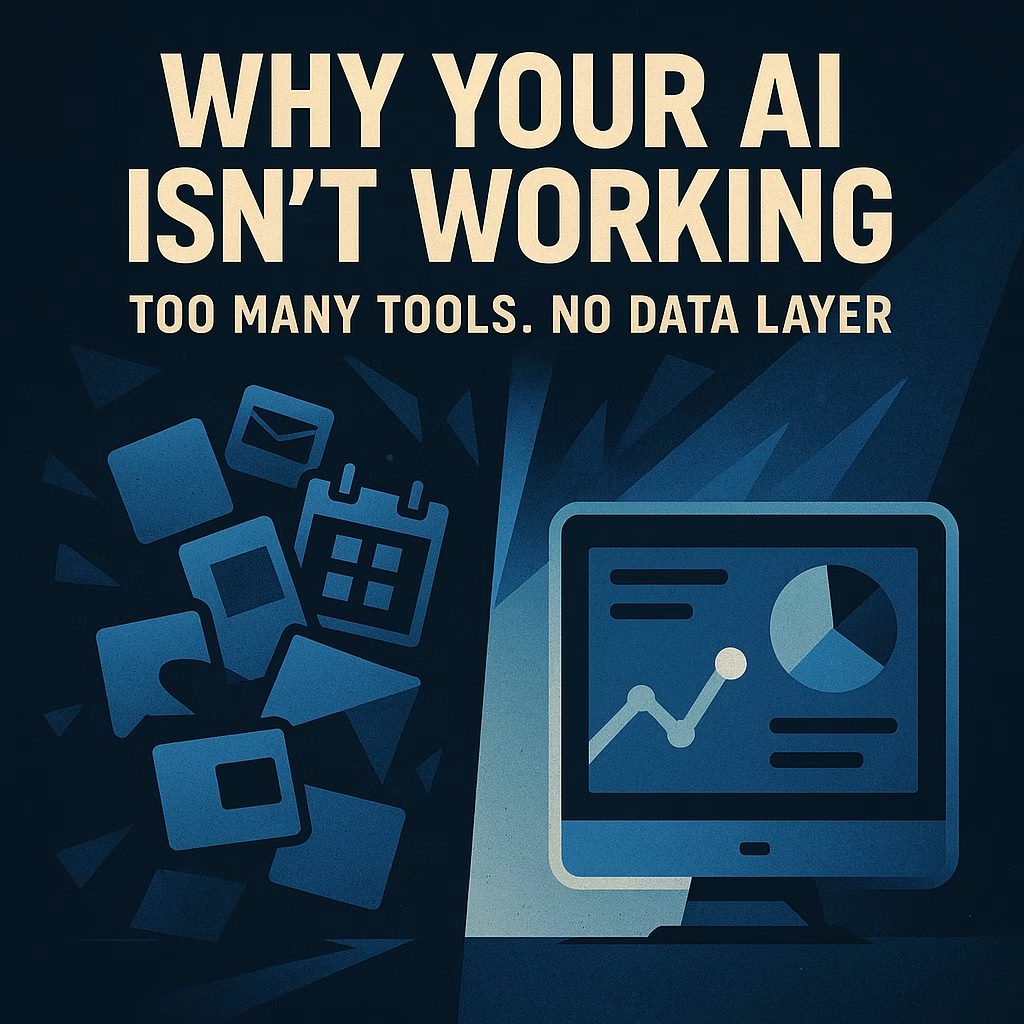
AI Automation in 2025: Transforming Service Businesses Through Speed, Savings and Better Customer Experiences
The service sector runs on speed and trust. Whether you’re a real‑estate agency, a healthcare provider, a trades business or a marketing agency, every missed call and every delayed response is a lost opportunity. Yet in 2025 the game has changed: artificial intelligence (AI) systems can now handle many of the time‑consuming tasks that used to drain staff hours. According to a recent roundup of research, the global AI customer service market grew from $12.06 billion in 2024 and is projected to reach $47.82 billion by 2030, representing a 25.8 % compound growth rate[1]. With 95 % of customer interactions expected to be AI‑powered by 2025[2], service businesses that adopt AI now are gaining a powerful competitive advantage.
Why Service Businesses Need to Get Faster
Consumers today expect near‑instant answers. A survey cited in Tidio’s 2025 customer service report found that as many as 90 % of customers expect an immediate response when asking a support question[3]. When response times slip, leads disappear and loyalty erodes. For lead‑driven industries like real estate, a slow follow‑up can mean losing a seller to a competitor. In healthcare, delays in responding to an enquiry can prevent a patient from getting timely care. AI automation solves these problems by keeping conversations alive around the clock.
Beyond speed, AI meets people where they are. A 2024 Harvard overview explains that AI now powers chatbots, social media management and full‑scale marketing campaigns, and that routine tasks such as writing copy, mining data and creating visuals that once took hours can now be done in minutes[4]. Customers are comfortable with this shift: research shows 62 % of customers prefer engaging with chatbots over waiting for human agents, and 74 % like using bots for simple questions[5]. This explains why 27 % of shoppers interact with chatbots daily and 34 % engage multiple times per week[5]. For service businesses, automating these first‑touch interactions lets human teams focus on high‑value conversations.
Efficiency and Cost Savings: The AI Dividend
The financial argument for AI automation is compelling. A 2025 study of AI customer service implementations found that the average return on investment is $3.50 for every $1 spent, with some top performers seeing up to 8× returns[5]. Those gains come from both revenue growth and cost reduction:
- Service cost reduction: AI reduces customer service costs by 25 %[5], in part because chatbot interactions cost about $0.50 each compared with $6.00 for a human agent[5].
- Time savings on calls: Intelligent assistants can shave 45 % off call times, helping companies achieve 44 % faster issue resolution[2].
- Daily efficiency: AI tools save service representatives about 1.2 hours per day and increase the number of inquiries handled per hour by 13.8 %[2].
- Operational improvements: By automating simple tasks, companies have achieved an 87 % reduction in average resolution times and improved first‑contact resolution rates by up to 30 %[2].
AI also taps hidden revenue. Conversational bots can automatically reach out to “dormant” leads sitting in your CRM. Many businesses find that these old contacts convert at higher rates when reactivated with personalized AI messages. The broader business case is clear: organizations using AI for reporting achieved 83 % revenue growth versus 66 % for teams without AI[5].
Adoption Trends: From Experiment to Mainstream
AI isn’t just for tech giants anymore. According to McKinsey’s global AI survey, 78 % of organizations use AI in at least one business function, and 71 % regularly use generative AI[6]. In customer service specifically, 26 % of professionals have integrated AI into their daily workflows, and 63 % of companies plan to increase AI investment[6]. Adoption varies by sector: 60 % of B2B companies and 42 % of B2C companies are already using chatbots[6], while 54 % of organizations are deploying conversational AI across phone, voice or virtual assistants[6].
These numbers are poised to rise. Fullview’s analysis cites Gartner predictions that by 2025, 80 % of customer service organizations will implement generative AI[2] and by 2027 25 % of organizations will use chatbots as their primary customer service channel[2]. Servion Global Solutions forecasts that 95 % of all customer interactions will be AI‑powered by 2025[2]. To meet this shift, leaders must ensure their teams have the skills to leverage AI. Yet a 2025 survey found 66 % of leaders believe their teams lack the necessary AI skills[2], highlighting a need for training and for partners who can handle implementation.
Impact on Sales and Lead Management
For businesses that depend on new clients or patients, AI is more than a customer service tool — it’s a sales accelerator. Speed‑to‑lead automation engages prospects in the critical first minutes. Tidio’s research notes that 83 % of businesses feel AI enables them to assist more customers[3], and chatbots can automate about 70 % of customer requests[3]. By triaging leads based on intent, AI ensures sales teams spend their time on high‑value conversations instead of tyre‑kickers.
AI systems also breathe life into stale databases. Many CRMs are full of leads that were never properly nurtured. Intelligent reactivation campaigns can quickly generate new appointments without increasing ad spend. BuildnBloom’s own clients see results like 312 reactivated leads in 60 days and 121 % increases in appointment conversion. These outcomes align with broader industry findings: Salesforce customers report an average revenue increase of 37 % when deploying AI tools[5]. Sales teams leveraging AI also attribute 20 % or more of their EBIT to AI[5], a sign that automated workflows can meaningfully impact the bottom line.
Putting AI to Work: Data & Operations, Voice & Engagement
AI’s versatility means it can be deployed across many functions in a service business. Here are some high‑impact use cases:
- Data & operations – AI can handle repetitive admin work like CRM cleanup, invoicing and reporting dashboards. Platforms can extract data from emails, consolidate it in your CRM and trigger automated workflows. The Fullview study indicates that service organizations could save $80 billion in contact center labor costs by 2026[5]. For industries like healthcare or trades, automated invoicing reduces errors and speeds up payments.
- AI voice & engagement – Intelligent voice agents answer phones, ask qualifying questions and book appointments. They deliver 24/7 coverage so you never miss a lead. Generative voice AI technology has reached the point where callers often can’t distinguish between a bot and a human agent. Voice bots can also handle routine outbound calls, freeing salespeople to focus on closing deals.
- Lead capture & qualification – AI chatbots integrated into websites and ads collect lead information, qualify prospects based on customized criteria and instantly book meetings. They can also push data into your CRM and trigger nurture sequences. This is critical because fast follow‑up increases conversion rates, and AI ensures no lead falls through the cracks.
- Customer support – Chatbots and virtual assistants answer common questions, handle account changes and provide personalized recommendations. According to research, service agents potentially replaced by generative AI could reach 20–30 % by 2026[2]. Rather than eliminating staff, this shift allows agents to spend more time solving complex problems and upselling services.
Preparing for the Future: Training and Strategy
The promise of AI can only be realized when businesses adopt a strategy that pairs technology with people. Leaders should:
- Audit current processes: Identify where time is lost and where AI can provide immediate relief. If response times are slow or CRMs are cluttered with stale leads, start there.
- Prioritize customer experience: Choose AI solutions that maintain a human‑like tone. The Harvard article warns that AI should empower, not alienate, customers[4]. Testing and fine‑tuning voice or text agents ensures conversations feel natural.
- Invest in training: Given that most leaders see an AI skills gap[2], businesses should offer training or partner with agencies that provide end‑to‑end implementation. Agents who understand how to work with AI will remain indispensable[7].
- Measure and iterate: Track metrics like response time, conversion rate, first‑contact resolution and revenue per lead. AI models improve with data, so continuous optimization is vital.
- Choose the right partner: Building a custom AI stack can be complex. A full‑service agency like BuildnBloom can design, build and manage your AI systems, ensuring they integrate with existing tools and comply with industry standards.
Conclusion: AI as a Competitive Advantage
AI automation has moved from futuristic promise to everyday necessity. The data shows that AI cuts costs, increases revenue and dramatically improves customer experience. By 2025, with customer interactions expected to be 95 % AI‑powered[2] and a market valued at over $47 billion by 2030[1], service businesses that hesitate risk being outpaced by AI‑enabled competitors. Meanwhile, those who embrace AI today will enjoy faster lead response, reactivated pipelines, happier customers and freed‑up staff time.
Ultimately, AI doesn’t replace the human element—it amplifies it. By handling routine tasks and engaging customers instantly, AI lets your team focus on what they do best: building relationships, solving complex problems and driving growth. Whether you’re a real‑estate agent tired of chasing tyre‑kickers, a healthcare provider juggling intake and invoicing, or an agency looking to scale without burning out staff, AI automation represents your chance to build a business that truly runs itself.
[1] [2] [5] [6] 80+ AI Customer Service Statistics & Trends in 2025 (Roundup)
https://www.fullview.io/blog/ai-customer-service-stats
[3] 10+ Crucial AI Customer Service Statistics (2025)
https://www.tidio.com/blog/ai-customer-service-statistics
[4] [7] AI Will Shape the Future of Marketing – Professional & Executive Development | Harvard DCE
https://professional.dce.harvard.edu/blog/ai-will-shape-the-future-of-marketing

Leave a Reply